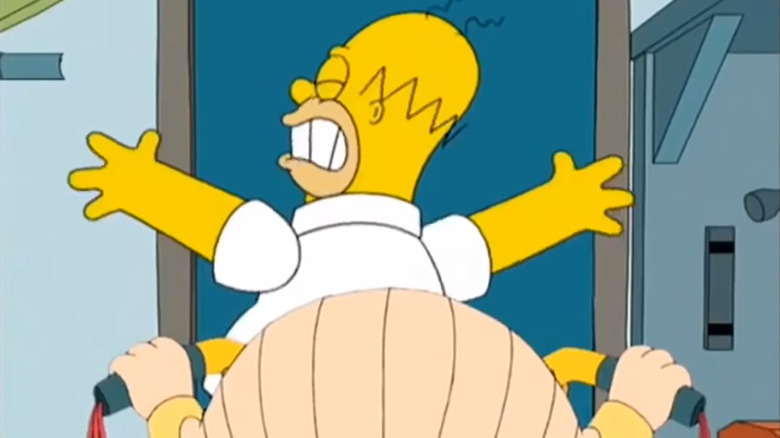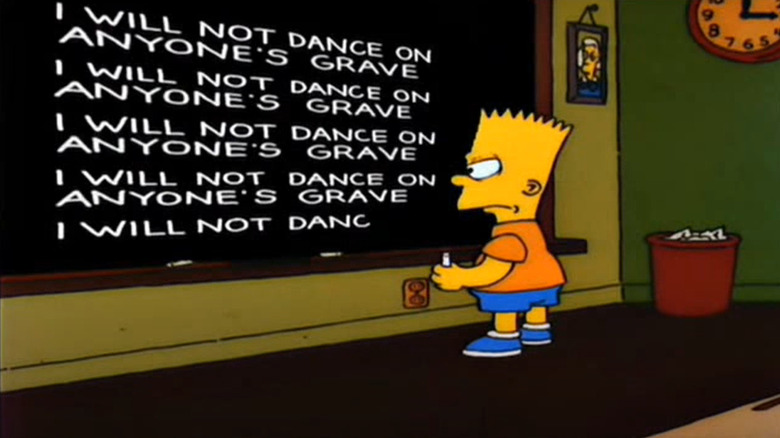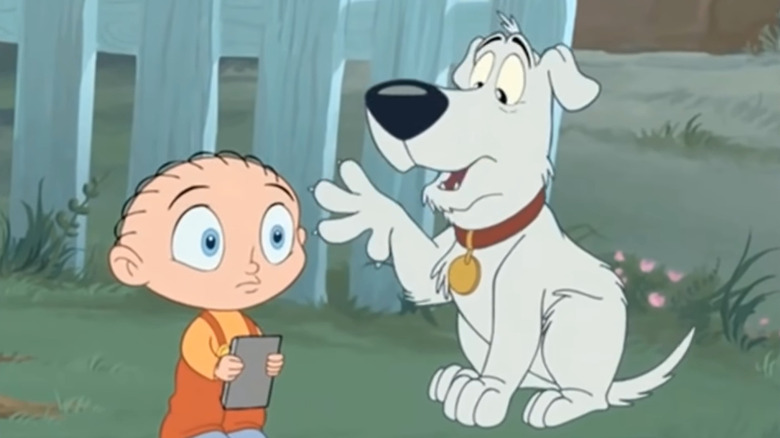Seth MacFarlane Wanted To Work For Disney Animation, Until The Simpsons Happened
This may come as a surprise to fans of Seth MacFarlane's raunchy, controversial animated sitcom "Family Guy," but one of his biggest influences as he first got into animation were the Disney movies of the '90s. Kid-friendly films like "Little Mermaid," "Beauty and the Beast," and "Aladdin" stuck out to him in his college years during Disney's second golden age. As he put it: "Everyone in our film department, in the animation division, kind of saw that as the ultimate goal ... that was kind of what I was really striving for."
This created a bit of a conflict for MacFarlane. Although his best chance of making a career in animation at the time was working on the strictly PG movies from Disney, he was also trying to make it as a stand-up comedian. And as "Ted" fans can probably guess, a lot of MacFarlane's jokes tend to skew in an R-rated direction. "I was really loving doing standup," he said, "but obviously it wasn't the kind of comedy I'd be doing if I worked for Disney."
Luckily for MacFarlane, a certain animated series aired on Fox in December of 1989 and quickly became one of the biggest shows on TV. Here's how he described discovering "The Simpsons":
"Suddenly I'm watching a cartoon that actually is making me laugh. It's for me, as an adult. This changes the game; the kind of humor that makes me laugh and the stuff that I was doing in my standup routines could now maybe meld with animation."
The Simpsons' mass cultural influence
MacFarlane has never been all that shy about how much "Family Guy" owes its success to Matt Groening's hit series. The MacFarlane-voiced characters would often poke fun at their own show for being derivative of "The Simpsons," with the show always seeming painfully aware of how much more respect their predecessor received. "We act like we didn't take a lot from The Simpsons," a drunken Peter muses in one episode, completely unprovoked, "but we took a lot from The Simpsons.'"
But to be fair, most adult-oriented animated sitcoms may not have been made if not for "The Simpsons" proving there was an audience for this type of show. MacFarlane pointed to shows like "South Park," "King of the Hill," and "Bob's Burgers" as being in a similar boat. "All those shows owe their existence ... their stylistic paradigm to 'The Simpsons,'" he said.
Each of these shows has managed to find a life of its own. "Family Guy" found its voice as a much raunchier and faster-paced show. Whereas "The Simpsons" could be watched with older members of the whole family, "Family Guy" was more clearly written for a strictly adult audience. (Although to be clear: the show was always very popular with middle school boys, even if they weren't technically supposed to watch it.) There was also the specificity of the show's setting: whereas the town of Springfield could conceivably exist in nearly any state in America, the town of Quahog is explicitly in Rhode Island, and Peter Griffin speaks with a strong Rhode Island accent.
The Simpsons' early controversies
Even though the early episodes of "The Simpsons" seem quaint today, the show was pushing boundaries for what was allowed on television in the early '90s. Bart was the show's standout character in the first two seasons, and also the subject of a lot of complaints that he was bad influence on children.
The complaints died down as the show permanently shifted to having Homer be its clear main character in season 3, but there were plenty of new controversies for the show to deal with as it dove into hot-button issues. The season 8 episode "Homer's Phobia," which centers around Homer being terrified that Bart might be gay, was initially rejected entirely by the Fox censors. From the Advocate: "[Showrunner Bill] Oakley recalled, 'every single thing in the episode that had to do with being gay or the word 'gay' received notes' — dozens of critiques that filled three pages." The report ended with the line: "The entire subject and content of this episode is unacceptable for air."
Another notable controversial "Simpsons" moment was the episode "A Streetcar Named Marge" which featured a musical number that sort of insulted the people of New Orleans — leading to an apology from the show in its opening theme where Bart wrote "I will not defame New Orleans" on the chalkboard. The show's many jokes poking fun of the Christian church also didn't help the show's standing with the religious right. In 1992, President George H. W. Bush famously said in a campaign speech that he would try "to make American families a lot more like the Waltons and a lot less like the Simpsons." Unfortunately for Bush, the Simpson family is still beloved, whereas few people today even remember who the Waltons were.
In the end, Disney conquers all
By the time shows like "Family Guy" and "South Park" aired in 1999, the rules of what these shows were able to get away with had loosened up significantly. The standard complaints about "Family Guy," from its matricidal baby, the regular acts of bestiality involving Brian Griffin, to its jokes about abortion, rape, and its blatantly anti-religious views, made the complaints about "The Simpsons" seem like nothing.
Although MacFarlane went in a very different direction from making the Disney kids' movies he grew up with, he did end up working for Disney in the end. With the company buying out 21st Century Fox in 2019, both "The Simpsons" and "Family Guy" are now Disney properties. It's a testament to both the absurd degree in which Disney has taken over the entertainment industry, as well as how normalized adult-oriented animation has become. The idea that the company responsible for "The Little Mermaid" would buy out an adult show with an evil, hyper-sexual baby would've been hard to imagine 20 years ago.
These days, however, MacFarlane doesn't write for "Family Guy," nor does he have any involvement with the show's current animation. He still voices the characters, but his attention is now focused on his "Star Trek"-inspired project "The Orville." The show's third season is currently airing on Hulu, every Thursday.



